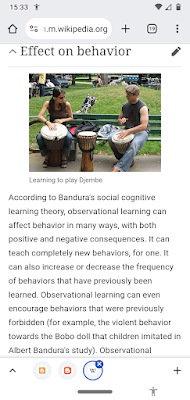1, 2, 3, 4
1
?Y
---------
2
Social L
Key Elements of Social Learning Theory:
Observational Learning:
Individuals learn by observing others' behaviors and the outcomes they experience. Modeling:
Individuals may imitate or model the behavior of others, especially if they perceive the model as credible, knowledgeable, or successful. Vicarious Reinforcement:
Observing others being rewarded or punished for their actions can influence an individual's own motivation to engage in similar behaviors. Self-Efficacy:
An individual's belief in their own ability to perform a particular behavior can influence their likelihood of engaging in it. Reciprocal Determinism:
Behavior, environment, and personal factors (like thoughts and feelings) interact in a dynamic way, influencing each other.
In essence, Social Learning Theory highlights the power of social interaction and observation in shaping human behavior and learning.
-------
3
Social learning - Wkpd
Social learning theory is a psychological theory of social behavior that explains how people acquire new behaviors, attitudes, and emotional reactions through observing and imitating others. It states that learning is a cognitive process that occurs within a social context and can occur purely through observation or direct instruction, even without physical practice or direct reinforcement.[1] In addition to the observation of behavior, learning also occurs through the observation of rewards and punishments, a process known as vicarious reinforcement. When a particular behavior is consistently rewarded, it will most likely persist; conversely, if a particular behavior is constantly punished, it will most likely desist.[2] The theory expands on traditional behavioral theories, in which behavior is governed solely by reinforcements, by placing emphasis on the important roles of various internal processes in the learning individual.[3] Albert Bandura[3] is widely recognized for developing and studying it. ...
Observation and direct experience
Typical stimulus-response theories rely entirely upon direct experience (of the stimulus) to inform behavior. Bandura opens up the scope of learning mechanisms by introducing observation as a possibility.[3] He adds to this the ability of modeling – a means by which humans "represent actual outcomes symbolically".[3] ...
An important factor in Social Learning Theory is the concept of reciprocal determinism. This notion states that just as an individual's behavior is influenced by the environment, the environment is also influenced by the individual's behavior.[14...
Modeling and underlying cognitive processes
editSocial Learning Theory draws heavily on the concept of modeling as described above. Bandura outlined three types of modeling stimuli:[16]
- Live models, where a person is demonstrating the desired behavior
- Verbal instruction, in which an individual describes the desired behavior in detail and instructs the participant in how to engage in the behavior
- Symbolic, in which modeling occurs by means of the media, including movies, television, Internet, literature, and radio. Stimuli can be either real or fictional characters.
...
Evolution and cultural intelligence
... Some academics have suggested that our ability to learn socially and culturally have led to our success as a species.[23]
----------
4
Observational learning - Wkpd
Quotes:
Observational learning is learning that occurs through observing the behavior of others. It is a form of social learning which takes various forms, based on various processes. In humans, this form of learning seems to not need reinforcement to occur, but instead, requires a social model such as a parent, sibling, friend, or teacher with surroundings. Particularly in childhood, a model is someone of authority or higher status in an environment. In animals, observational learning is often based on classical conditioning, in which an instinctive behavior is elicited by observing the behavior of another (e.g. mobbing in birds), but other processes may be involved as well.[1] ...

Influential stages and factors
The stages of observational learning include exposure to the model, acquiring the model's behaviour and accepting it as one's own.
Bandura's social cognitive learning theory states that there are four factors that influence observational learning:[8]
- Attention
- Retention / Memory
- Initiation / Motor [Production - below]
- Motivation
... Apprenticeship ...
Peer model influencesedit
Observational learning is very beneficial when there are positive, reinforcing peer models involved. Although individuals go through four different stages for observational learning: attention; retention; production; and motivation, this does not simply mean that when an individual's attention is captured that it automatically sets the process in that exact order. One of the most important ongoing stages for observational learning, especially among children, is motivation and positive reinforcement.[26]
Performance is enhanced when children are positively instructed on how they can improve a situation and where children actively participate alongside a more skilled person. Examples of this are scaffolding and guided participation. Scaffolding refers to an expert responding contingently to a novice so the novice gradually increases their understanding of a problem. Guided participation refers to an expert actively engaging in a situation with a novice so the novice participates with or observes the adult to understand how to resolve a problem.[27]







Коментари
Публикуване на коментар